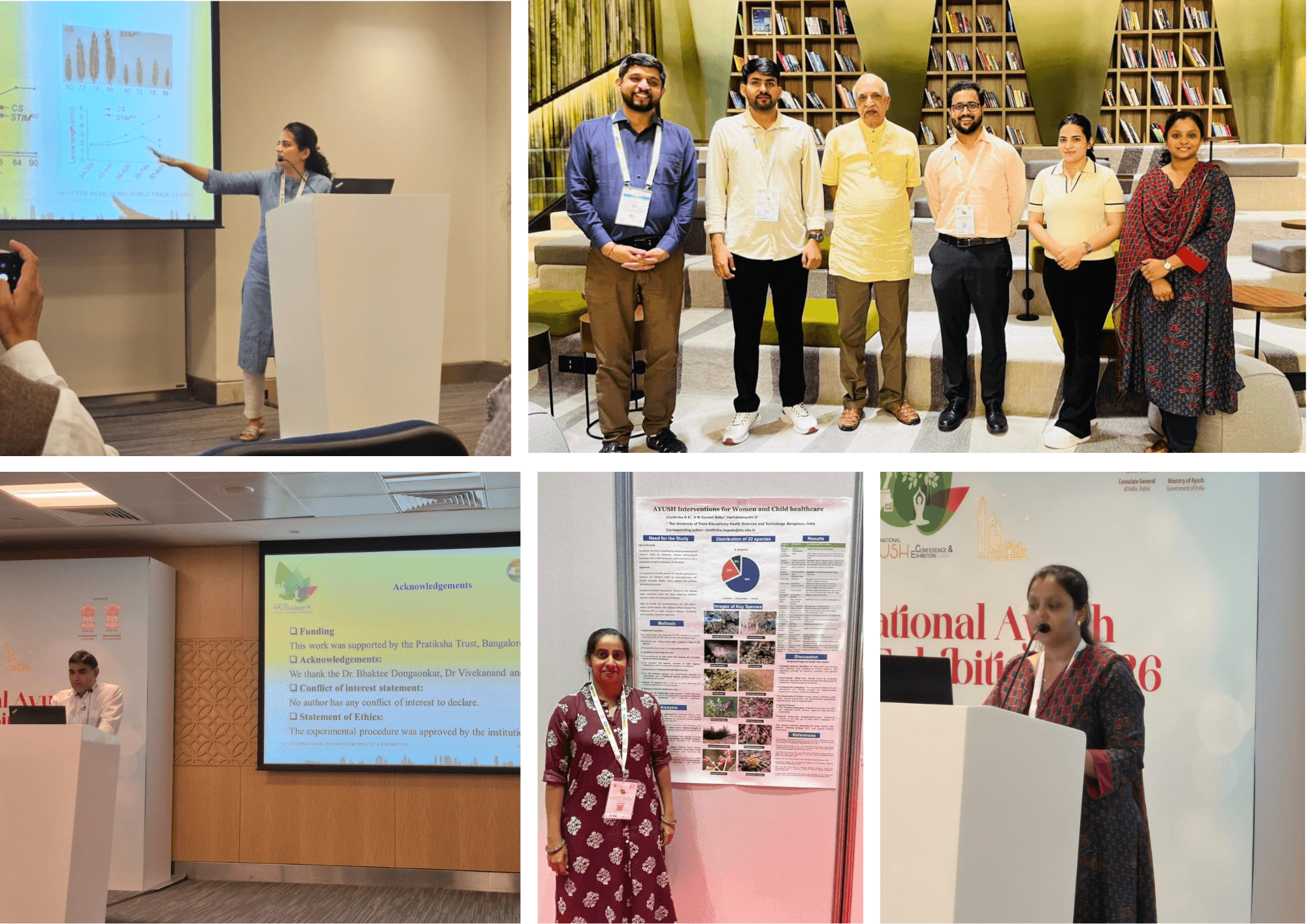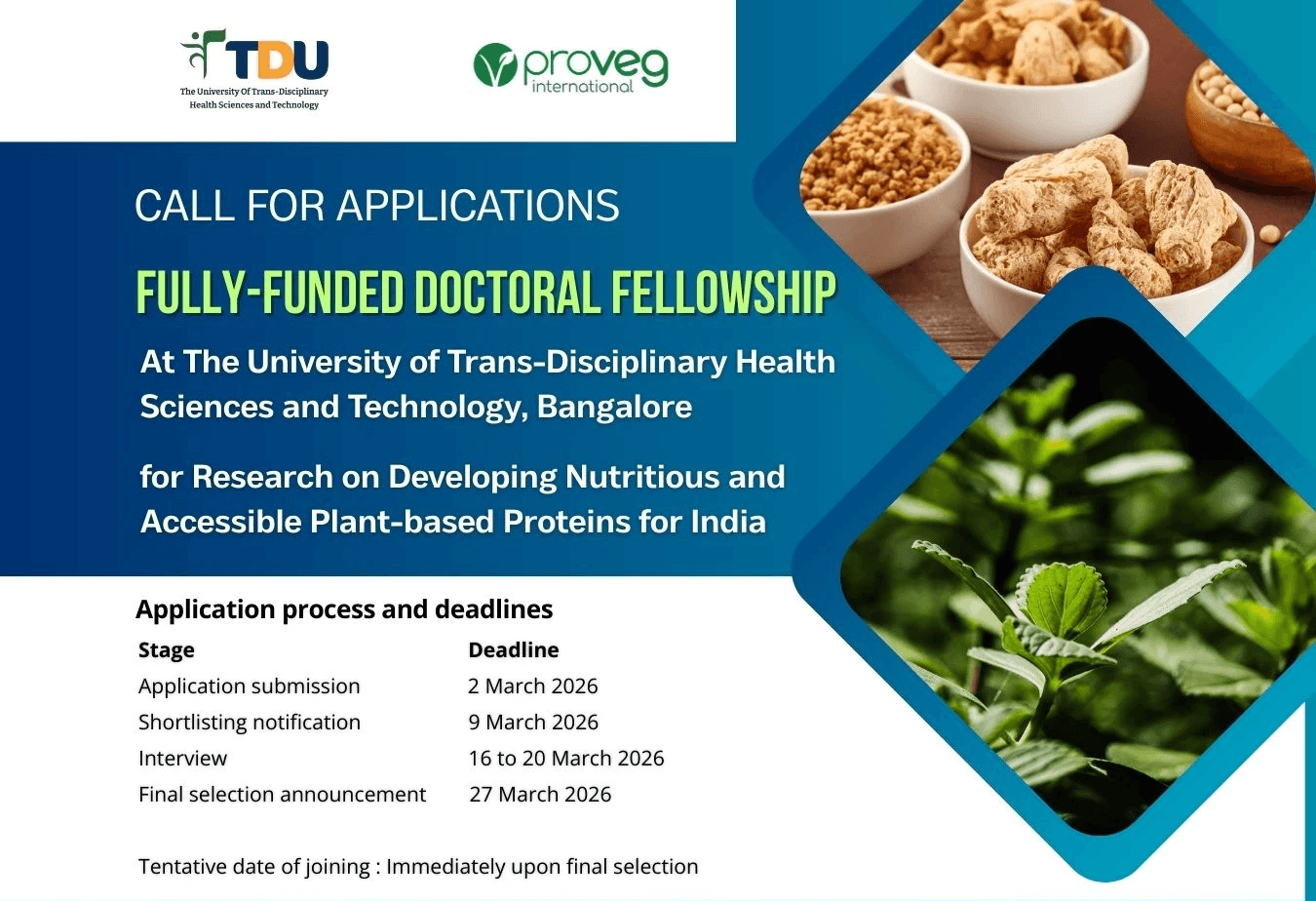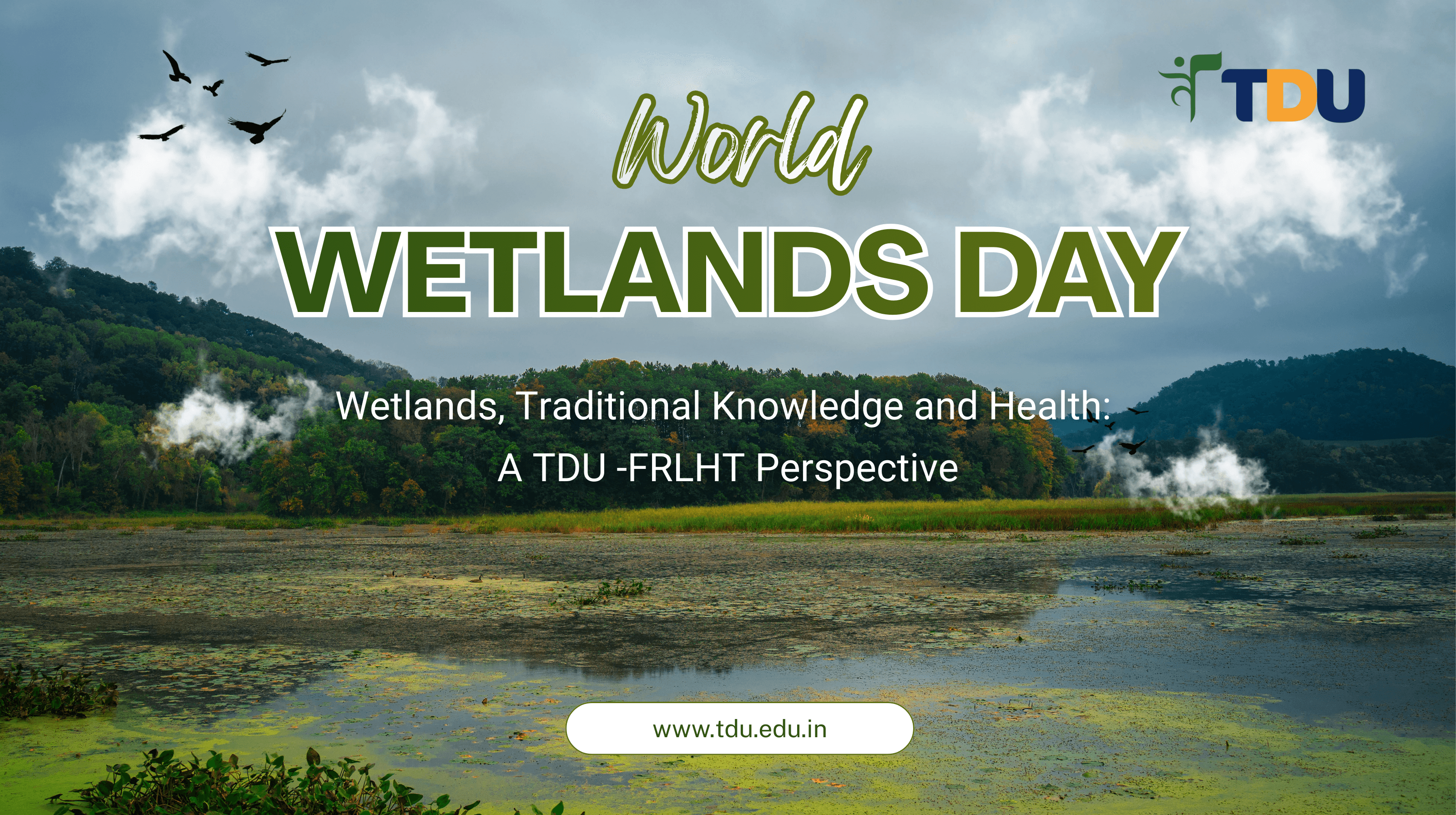
admissions@tdu.edu.in
+91-80-2856 8000

Admissions closed for Feb 2026, Reopens on 1st Mar 2026 for Jul 2026
Admissions closed for Feb 2026, Reopens on 1st Mar 2026 for Jul 2026

Admissions closed for Feb 2026, Reopens on 1st Mar 2026 for Jul 2026
Admissions closed for Feb 2026, Reopens on 1st Mar 2026 for Jul 2026
The University of Trans-Disciplinary
Health Sciences and Technology (TDU)
The University
of Trans-Disciplinary
Health Sciences and Technology (TDU)
Research and education in integrative health sciences and technology that bridges traditional wisdom with cutting-edge science, and fosters a unique ecosystem.
At TDU, we are proud to be recognised as one of the best research university in Bengaluru, excelling in transdisciplinary research. Our core strength lies in integrating Ayurveda with modern Biology into a new area of research known as Ayurveda Biology. Other areas of trans-disciplinary research include Clinical Medicine, Medicinal Plants Systematics, Plant Genomics, Data Sciences, Local Health Traditions, Theoretical Foundations of Ayurveda, Traditional Knowledge Informatics, and Manuscriptology.
About TDU
About TDU
What is Trans-Disciplinary Research?
What is Trans-Disciplinary Research?
Trans-disciplinary research represents a powerful approach that breaks down traditional academic boundaries by weaving together knowledge, methods, and perspectives from multiple disciplines. It creates a unified framework in which experts from diverse backgrounds, both STEM and other disciplines, can collaborate to address complex challenges facing our world today.
Trans-disciplinary research represents a powerful approach that breaks down traditional academic boundaries by weaving together knowledge, methods, and perspectives from multiple disciplines. It creates a unified framework in which experts from diverse backgrounds, both STEM and other disciplines, can collaborate to address complex challenges facing our world today.
Trans-disciplinary research represents a powerful approach that breaks down traditional academic boundaries by weaving together knowledge, methods, and perspectives from multiple disciplines. It creates a unified framework in which experts from diverse backgrounds, both STEM and other disciplines, can collaborate to address complex challenges facing our world today.
Enhanced Innovation
Creative thinking and cutting-edge methodologies , merging Shasthra & Science transforming traditional approaches in to contemporary relevant,accessible and sustainable solutions.
Societal Impact
Engaging with grassroot communities to organisations and governments, we are driving impactful change creating affordable, accessible and scalable solutions rooted in Indian medical heritage for unmet social needs.




Research at TDU
Research at TDU
Trans-Disciplinary research is at the core of TDU
Trans-Disciplinary research is at the core of TDU
Trans-Disciplinary research is at the core of TDU
Transdisciplinary research is increasingly recognized as essential for addressing 21st-century challenges that are too complex for any single discipline or sector to solve alone. At TDU, Transdisciplinary research creates new frameworks and solutions by fully merging knowledge, theories, and methodologies from multiple disciplines. This approach involves stakeholders outside of academia including the community, policymakers, and industry experts, to co-produce knowledge and ensure that research outcomes are relevant and sustainable.
Transdisciplinary research is increasingly recognized as essential for addressing 21st-century challenges that are too complex for any single discipline or sector to solve alone. At TDU, Transdisciplinary research creates new frameworks and solutions by fully merging knowledge, theories, and methodologies from multiple disciplines. This approach involves stakeholders outside of academia including the community, policymakers, and industry experts, to co-produce knowledge and ensure that research outcomes are relevant and sustainable.
Transdisciplinary research is increasingly recognized as essential for addressing 21st-century challenges that are too complex for any single discipline or sector to solve alone. At TDU, Transdisciplinary research creates new frameworks and solutions by fully merging knowledge, theories, and methodologies from multiple disciplines. This approach involves stakeholders outside of academia including the community, policymakers, and industry experts, to co-produce knowledge and ensure that research outcomes are relevant and sustainable.
Our Mission
Our Mission
Inspire minds of students and faculty to design, participate and execute innovative Trans-disciplinary socially impactful research, education and outreach programs in Integrative Health Sciences and other fields of knowledge.
Inspire minds of students and faculty to design, participate and execute innovative Trans-disciplinary socially impactful research, education and outreach programs in Integrative Health Sciences and other fields of knowledge.
Inspire minds of students and faculty to design, participate and execute innovative Trans-disciplinary socially impactful research, education and outreach programs in Integrative Health Sciences and other fields of knowledge.
Our Vision
Our Vision
Social transformation through innovation inspired by Ayurveda, Natural and Social Sciences and Technology.
Social transformation through innovation inspired by Ayurveda, Natural and Social Sciences and Technology.
Social transformation through innovation inspired by Ayurveda, Natural and Social Sciences and Technology.

TDU News

Dr. Mayur D. Nandikar, Associate Professor has published a paper in the international journal TAXON
Explore TDUs repository of research and expertise
Explore TDUs repository of research and expertise

When tradition speaks the language of science, transformation begins
Explore TDUs repository of research and expertise
Explore TDUs repository of research and expertise

Indian Medical Heritage Day – 19 February 2026
Explore TDUs repository of research and expertise
Explore TDUs repository of research and expertise

Dr. Mayur D. Nandikar, Associate Professor has published a paper in the international journal TAXON
Explore TDUs repository of research and expertise

When tradition speaks the language of science, transformation begins
Explore TDUs repository of research and expertise

Indian Medical Heritage Day – 19 February 2026
Explore TDUs repository of research and expertise

Call for Applications : Fully - Funded Doctoral Fellowship
Explore TDUs repository of research and expertise
TDU Events

Microbiome and Nutrition Workshop
Read more

Professional Development Workshop for Early - Career Nutritionists
Step Up Your Practice
Professional Development Workshop for Early-Career Nutritionists
Saturday, 28 March 2026 | 10am - 4pm
Read more

Exciting Announcement | National Workshop at TDU
The University of Trans-Disciplinary Health Sciences and Technology (TDU), Bengaluru, is delighted to host a Two-Day National Workshop on “The Nature of Knowledge” on February 13 - 14, 2026
Read more

Microbiome and Nutrition Workshop
Read more

Professional Development Workshop for Early - Career Nutritionists
Step Up Your Practice
Professional Development Workshop for Early-Career Nutritionists
Saturday, 28 March 2026 | 10am - 4pm
Read more

Exciting Announcement | National Workshop at TDU
The University of Trans-Disciplinary Health Sciences and Technology (TDU), Bengaluru, is delighted to host a Two-Day National Workshop on “The Nature of Knowledge” on February 13 - 14, 2026
Read more

Wild Edible Experience - Forage and Feast
Join us at TDU for a transformative experience where nature’s pantry becomes your playground!
Read more

About TDU
We’re a University in a larger ecosystem
We’re a University in a larger ecosystem
We’re a University in a larger ecosystem
A Unique Ecosystem, the first-of-its-kind in India, TDU is a private research university working closely with its constituent unit, the Institute of Ayurveda and Integrative Medicine (IAIM), a charitable research hospital, and with its parent NGO, the Foundation for Revitalisation of Local Health Traditions (FRLHT).
A Unique Ecosystem, the first-of-its-kind in India, TDU is a private research university working closely with its constituent unit, the Institute of Ayurveda and Integrative Medicine (IAIM), a charitable research hospital, and with its parent NGO, the Foundation for Revitalisation of Local Health Traditions (FRLHT).
TDU Blogs
The University of Transdisciplinary Health Sciences and Technology (TDU) Calls for Action to Conserve Medicinal and Aromatic Plants for Health, Heritage and Livelihoods
Read more
Wetlands are dynamic ecosystems where water meets land, creating rich habitats that support biodiversity, water security, climate resilience and cultural heritage. Observed annually on 2 February, World Wetlands Day commemorates the adoption of the Ramsar Convention (1971) and underscores the essential role wetlands play for both nature and people worldwide.
Read more
On International Environmental Education Day (January 26), we are reminded of a powerful truth: The future of our planet depends on what and how we teach today.
Read more

The University of Transdisciplinary Health Sciences and Technology (TDU) Calls for Action to Conserve Medicinal and Aromatic Plants for Health, Heritage and Livelihoods
Read more

Wetlands are dynamic ecosystems where water meets land, creating rich habitats that support biodiversity, water security, climate resilience and cultural heritage. Observed annually on 2 February, World Wetlands Day commemorates the adoption of the Ramsar Convention (1971) and underscores the essential role wetlands play for both nature and people worldwide.
Read more

On International Environmental Education Day (January 26), we are reminded of a powerful truth: The future of our planet depends on what and how we teach today.
Read more
EDUCATION
We have the best-in-class programs
We have the
best-in-class programs

Undergraduate Programs
The undergraduate programs integrate traditional wisdom and modern practices, and offer students a comprehensive education that blends theoretical knowledge with practical experience.
Read more

Postgraduate Programs
The postrgraduate programs are designed to advance knowledge and expertise at the intersection of traditional and modern health sciences.
Read more

Learning for Life Programs
Through workshops, seminars, and experiential learning opportunities, students are enabled with essential life skills and knowledge that extend beyond traditional academic learning.
Read more
We're on Youtube!
As 'The University of Trans-Disciplinary Health Sciences and Technology (TDU)', Bengaluru, completes 10 years of operations, we remember our transformative journey, and continue to be inspired by it.




RESEARCH & OUTREACH
More than a University
More than a University
As 'The University of Trans-Disciplinary TDU is more than a university. It is a first-of-its-kind research and outreach hub, making impactful contributions to society, in healthcare, conservation, and sustainability, offering access to various databases using innovative technology integration, and unique outreach programs. Sciences and Technology (TDU)', Bengaluru, completes 10 years of operations, we remember our transformative journey, and continue to be inspired by it.
As 'The University of Trans-Disciplinary TDU is more than a university. It is a first-of-its-kind research and outreach hub, making impactful contributions to society, in healthcare, conservation, and sustainability, offering access to various databases using innovative technology integration, and unique outreach programs. Sciences and Technology (TDU)', Bengaluru, completes 10 years of operations, we remember our transformative journey, and continue to be inspired by it.
Testimonials

Mr Ratan Tata
“I think those of us who have an open mind realize that if there could be a fusion of Ayurveda and Western Medicine, we could improve treatments and early detection of some disease”

Sri M
“A unique place doing something to bring about a change in making us reflect and respect our medical heritage. Wonderful effort!”

Mr Azim Premji
"A first rate healthcare facility for healing based on India’s great medical heritage.”

Mr Soumitra Bhattacharya
"The facility was one of its kind in India and my visit was very insightful. The detailed study being done and the meticulous way in which the data is stored and used is very impressive"

Mrs Kiran Mazumdar Shaw
“There is an urgent need for the convergence of traditional and modern medicine to augment health especially in a country like India where we have a wealth of traditional knowledge that needs to be leveraged and synergised with modern medicine. I-AIM Healthcare Centre Bengaluru is certainly a front runner in this emerging space of holistic healthcare.”

Mr S Ramadorai
" A unique university of the future building upon INDIA’s GREAT KNOWLEDGE HERITAGE”
















